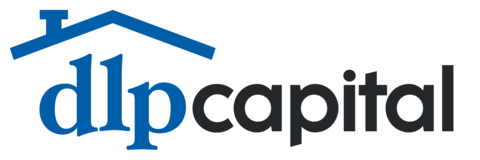
Intro — DLP Capital's History
Founded in 2006 and based in St. Augustine, Florida, DLP Capital is a private real estate investment and finance firm that has steadily grown into a prominent player in the alternative investment space. Led by CEO Don Wenner, DLP (short for “Dream Live Prosper”) differentiates itself by combining impact-oriented investing with real estate development and lending. In other words, it’s a bit of an upmarket, luxury brand — even among the landscape of real estate crowdfunding platforms, which are typically marketed to affluent folks.
While platforms like Ark7 or Arrived offer fractionalized, tech-enabled access to residential rentals, DLP Capital operates at a larger, more institutional scale. Its investment offerings are targeted primarily to very high-net-worth accredited investors seeking real estate funds and debt instruments.
Unlike some newer platforms chasing casual retail investors, DLP Capital emphasizes strong underwriting standards, vertically integrated operations, and conservative investment principles. However, this more traditional approach does come with a substantially higher barrier to entry and a substantially more complex investor onboarding process.
So is DLP Capital the right fit for you — or just another glossy real estate brand that’s less than meets the eye? Let’s dig into the details.

(Pictured: DLP Capital CEO Don Wenner.)
Key Features
DLP Capital’s model centers around diversified funds that invest in single-family and multifamily real estate developments, bridge lending, and income-producing assets. Investors can typically choose from four main fund types:
- DLP Housing Fund – Equity-focused, centered on acquiring and developing affordable and workforce housing communities.
- DLP Lending Fund – Offers passive exposure to short-term real estate debt, targeting consistent monthly income.
- DLP Preferred Credit Fund – Combines debt and equity investments with enhanced downside protection.
- DLP Building Communities Fund – Equity-focused, with the goal of “positively impact[ing] the workforce housing crisis in America through equity investments in ground up development and construction of workforce rental communities.” They’re trying to do some good here, supposedly.
What makes DLP stand out is its vertically integrated approach: the firm not only sources and manages deals, but also operates property management, construction, and lending arms. This level of control can provide added confidence around execution — but it also means investors are betting on DLP’s internal teams across all parts of the value chain. In other words, you have to know whether you like the totalitarian approach before putting up capital.
Returns are distributed monthly or quarterly, depending on the fund, and investors receive ongoing reporting. DLP emphasizes both impact and profit: they aim to solve the affordable housing crisis while generating double-digit annual returns — a bold claim in today’s real estate market. (Maybe this mission is intended to tie into their Christian ethos — see below.)
Investment Opportunities
DLP Capital’s investment opportunities are available only to accredited investors and typically require minimum investments starting at $200,000. While this categorically excludes casual or early-stage investors, it ensures a more professional investor base and positions DLP as a serious contender in the private equity space.
Investors gain access to diversified portfolios of real estate assets rather than individual property picks. This fund-based model provides stability and scale, but limits investor autonomy in choosing where their capital goes. Investors should evaluate the fund strategy, historic performance, and risk profile thoroughly before committing.
Fee Structure
DLP Capital charges a management fee (typically ~1%–2% annually, depending on the fund) and may also collect performance-based incentives. While not as fee-heavy as some retail-facing platforms, the layered fund structure means fees can compound over time. Transparency is decent — most fund documents outline projected net returns after fees.
There’s also a 0.50% annual investment rebate for investments of more than $1 million, and a 1.0% annual rebate for investments of $10 million.
Minimum Investment
DLP Capital requires significantly more capital than platforms like Fundrise and Arrived, or even EquityMultiple, CrowdStreet, and RealtyMogul (which all cater to accredited investors). The typical minimum commitment is $200K, which is a truly staggering number in this industry.
This makes DLP better suited for high-net-worth accredited investors who are committed to building long-term exposure in real estate, rather than trying out a new investment category.
User Experience
The DLP investor portal provides regular reports, fund updates, and K-1 documents. The user interface is functional — less flashy than mobile-first platforms, but straightforward and informative.
Most investors access the platform via desktop, with account managers assisting during the onboarding process. Because DLP prioritizes relationships, don’t expect a 100% self-serve experience — there’s more hands-on interaction, including scheduled calls and investor events.
Customer Support
DLP Capital places a heavy emphasis on personalized service. Investors are assigned a dedicated relationship manager and receive regular updates via webinars, email, and investor newsletters.
While this white-glove approach is appreciated by many, it may not appeal to younger or tech-native investors who prefer instant chat support or mobile responsiveness. That said, DLP’s customer support appears to be generally positively received.
Investor Testimonials
Common Praise
- Good returns ("I've been with DLP for over 5 years and have been getting consistent double digit growth")
- Good customer service ("Much of our satisfaction is due to the degree of personal customer service we have received from the Investor Success Manager")
Common Complaints
- There aren't many investor complaints, but there are some internal issues at the company worth knowing about (read on for more info).
DLP Capital is a Faith-Based Organization
A heads up to those who don’t already know: DLP Capital is a Christian organization (although it’s not obvious from the front page of their site), unlike pretty much every other real estate crowdfunding company on the market. Don Wenner preaches a lot to customers in their marketing emails and quotes Bible verses.
Make sure you’re fine with that before signing up, so the rug doesn’t get pulled out from under you like it did for this Bogleheads.org user.
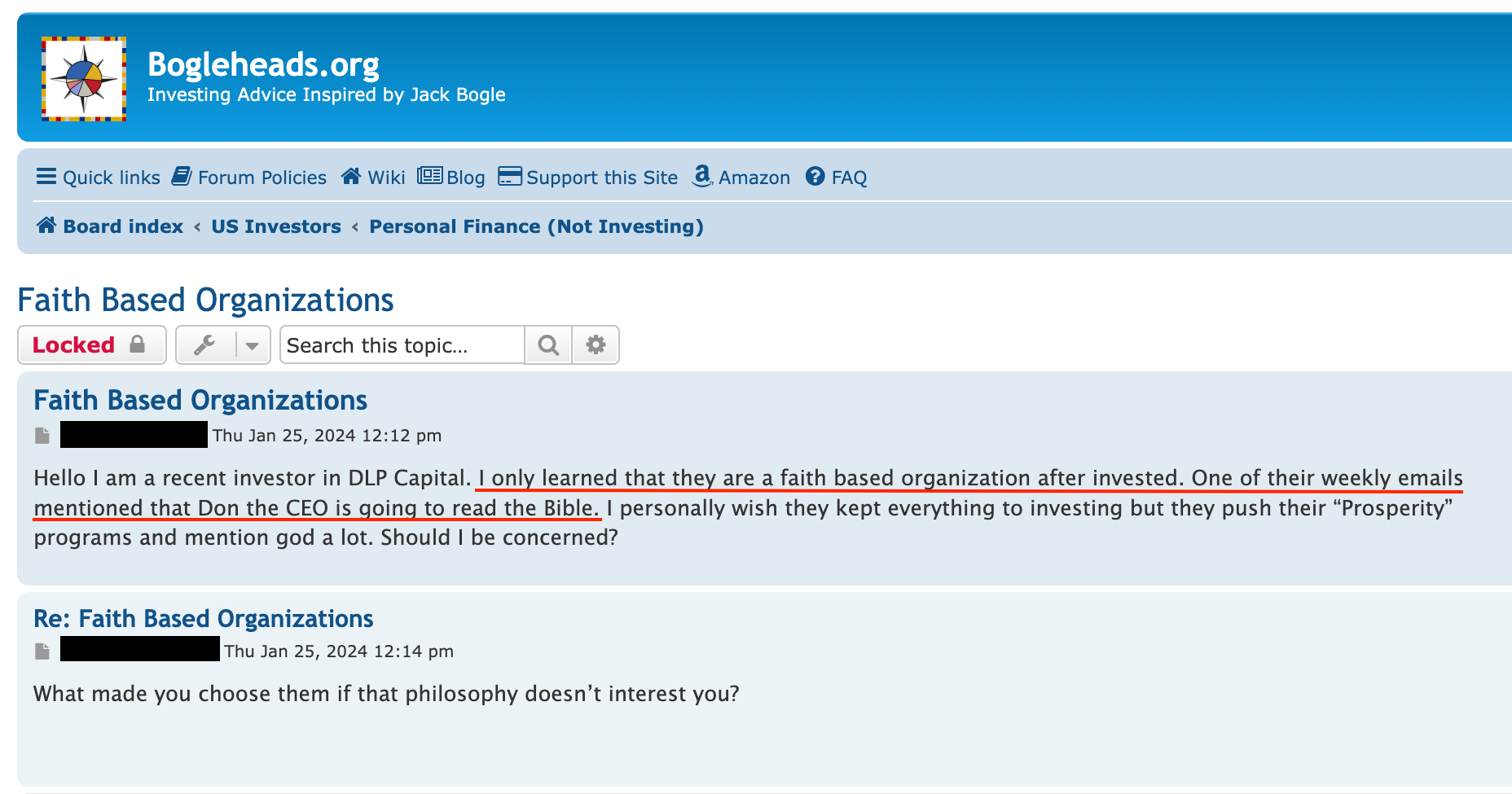
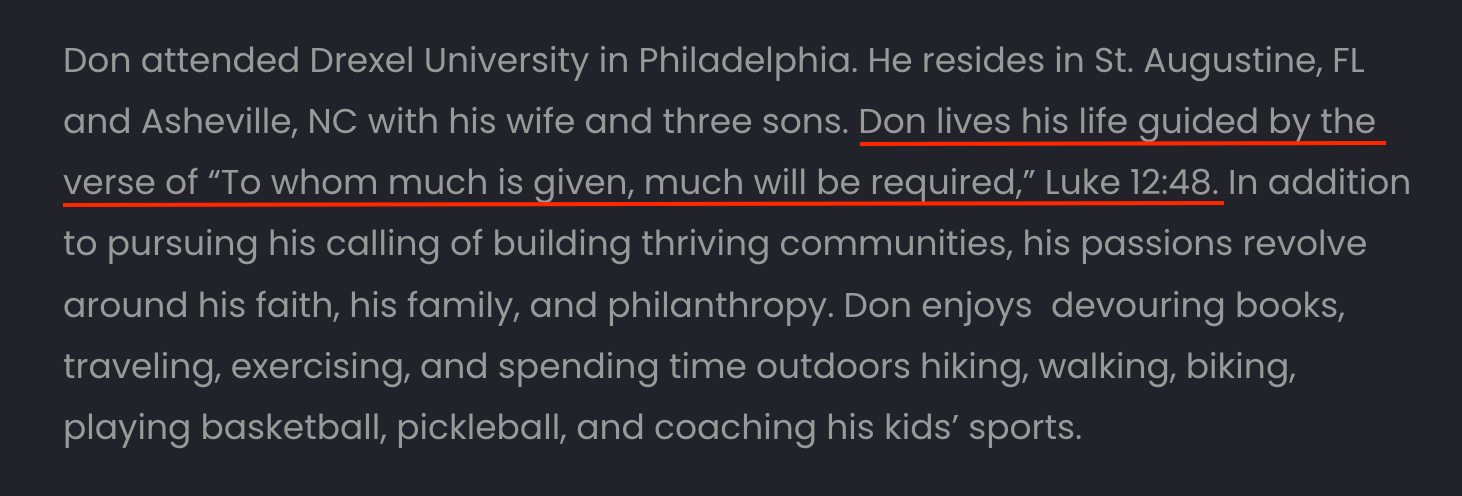
A couple of Glassdoor reviews
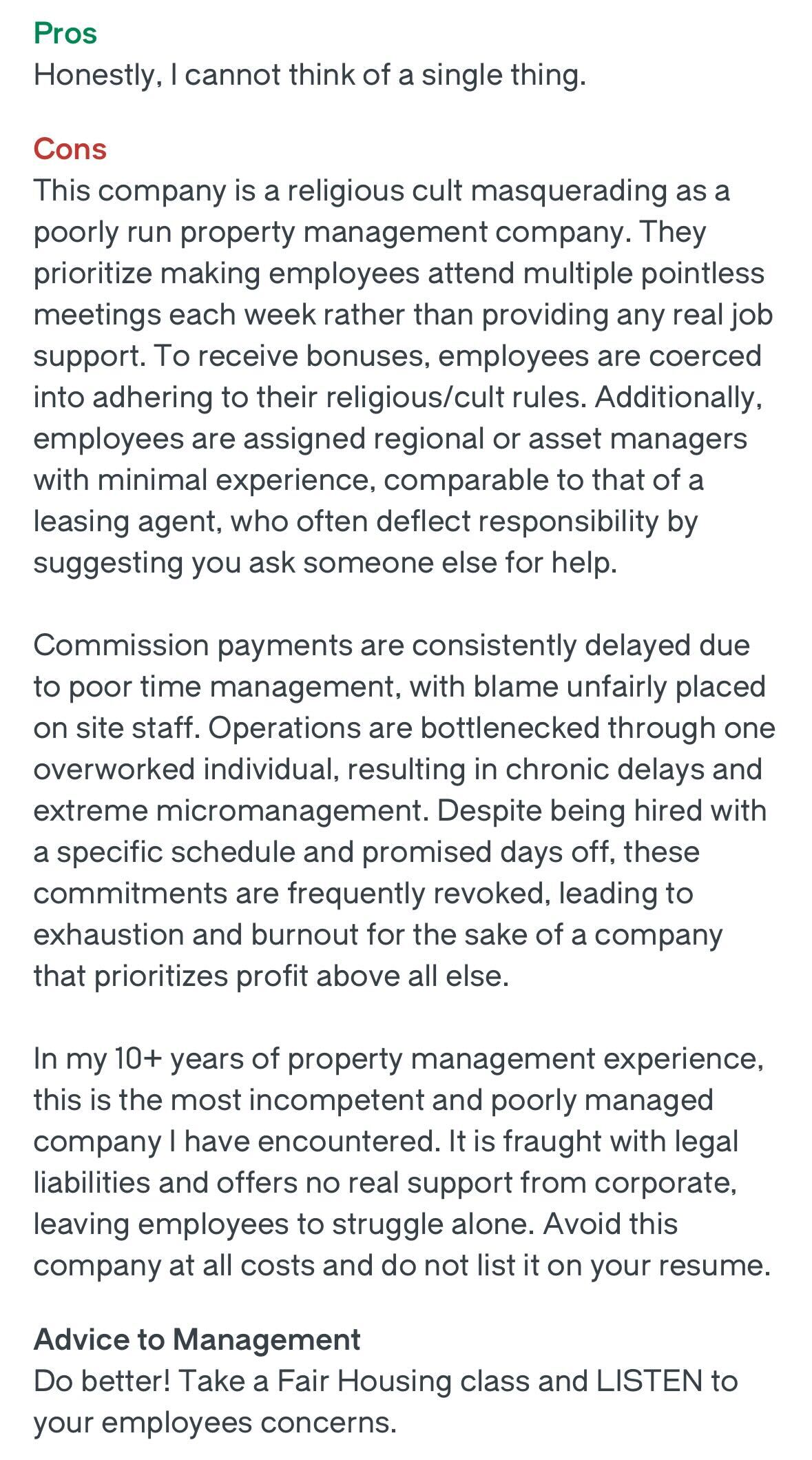
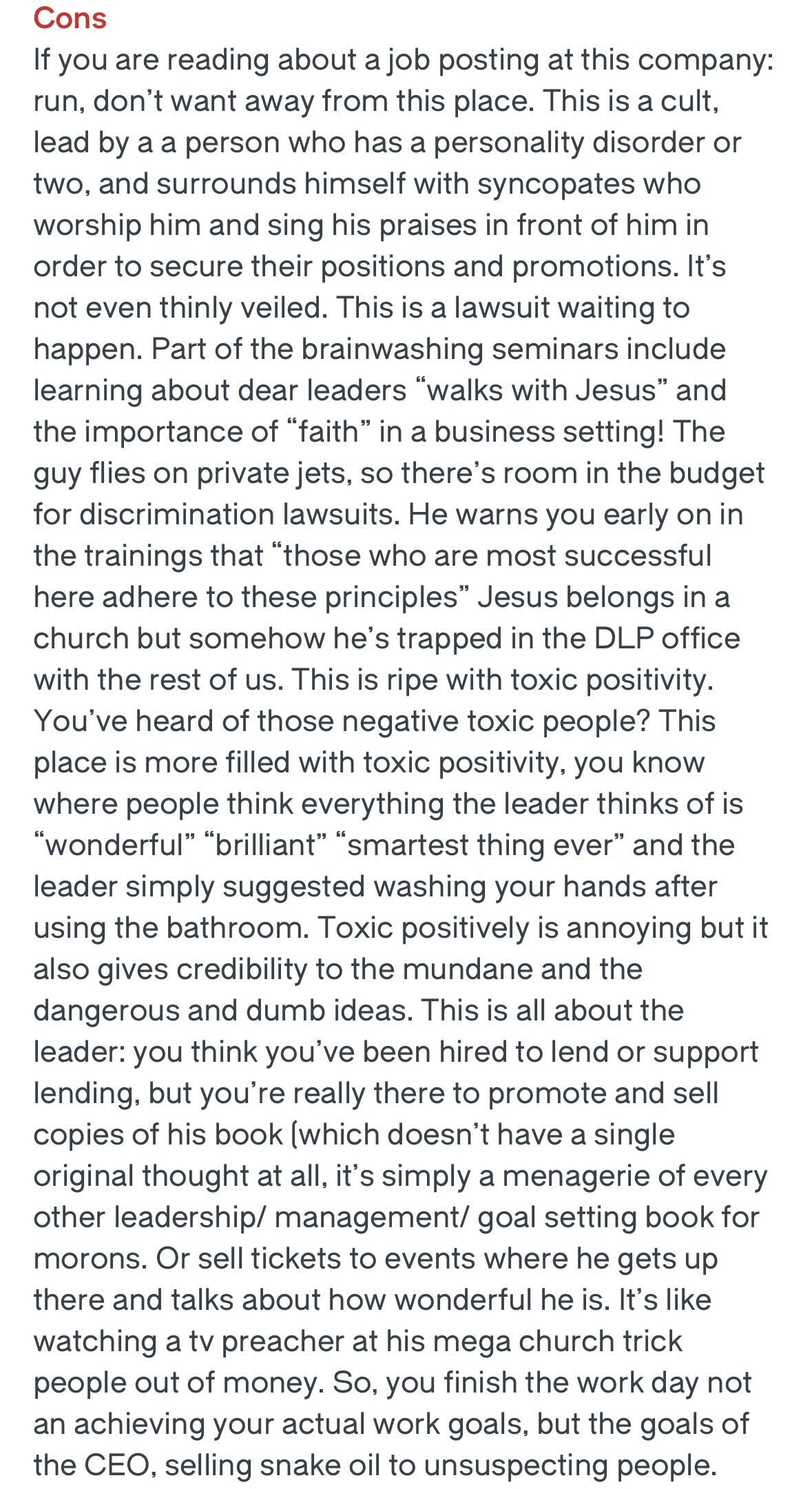
DLP Capital Controversies
On October 19, 2024, DLP Capital and Anthony Ruben, a former senior managing director of investments at DLP Capital, reached a settlement agreement. Ruben had filed a lawsuit against DLP Capital Partners, LLC in 2022, alleging that the company had promised him shares of its profits but fired him instead.
On The White Coat Investor, a user writes: “I had considered investing in DLP several times. A friend of mine recommended caution and I never pulled the trigger.And now I was sent a link to this very concerning article about potential misrepresentation and fraud. Has anyone heard anything more about these issues? Any DLP investors here who have more information?”
The article in question can be found here.
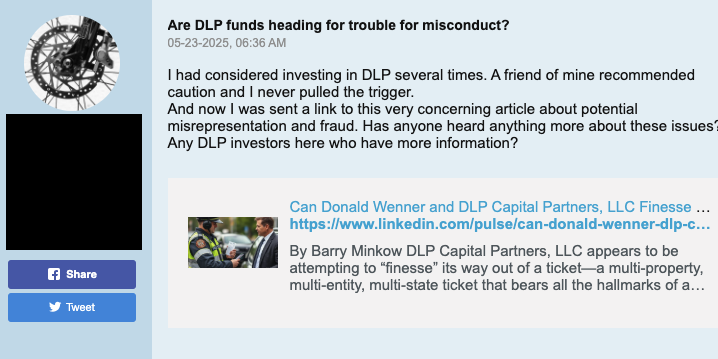
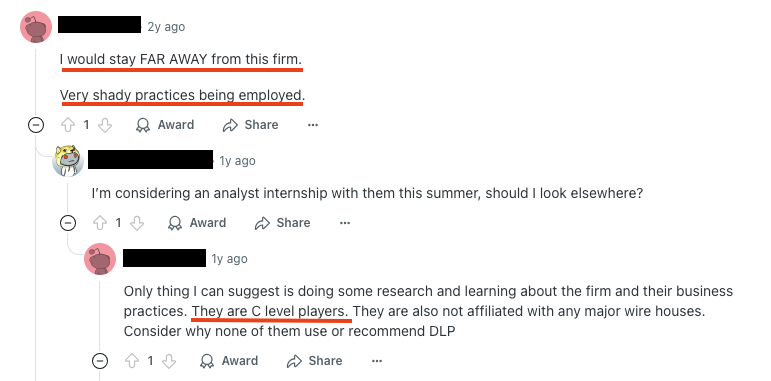
Similar Real Estate Crowdfunding Platform Comparison
DLP Capital vs. Arrived
While Arrived offers fractional shares in single properties with low minimums, DLP focuses on full-fund investments for accredited investors. Arrived is more retail-accessible; DLP offers more robust risk management and vertical integration.
DLP Capital vs. Fundrise
Fundrise focuses on diversified real estate funds, similar to DLP. However, DLP offers deeper due diligence, relationship-driven service, and access to more sophisticated deal structures. Unlike Fundrise, it's only open to well-capitalized accredited investors.
DLP Capital vs. EquityMultiple
EquityMultiple and DLP Capital both cater to accredited investors, but EquityMultiple emphasizes deal-by-deal flexibility, while DLP favors evergreen or closed-end funds with a long-term focus.
Scoring DLP Capital
Platform Details
- Years in Operation: 19 (since 2006)
- Minimum Investment: $200,000 (varies by fund)
- Types of Investments Offered: Equity and debt in residential real estate
- Accreditation Requirement: Yes
User Experience
- Ease of Use: 3.5 Stars ... Professional interface but less tech-forward than competitors, requires more hands-on interaction
- Account Setup: 3 Stars ... Lengthy onboarding process with relationship manager involvement, complex due to high minimums and accreditation requirements but necessarily complex due to accreditation requirements
- Customer Support: 4 Stars ... White-glove service with dedicated relationship managers, though may feel outdated to tech-savvy investors
Investment Experience
- Investment Options: 2.5 Stars ... Limited to four main fund types with little flexibility for investors to choose specific properties or deals and often unavailable properties, concentrated in specific regions, making diversification difficult
- Returns: 3 Stars ... While historical returns appear solid, recent legal controversies and internal disputes raise serious questions about future performance and management integrity
- Risk Management: 2.5 Stars ... Vertical integration provides control but creates concentration risk; recent lawsuit settlements suggest potential operational and governance issues
Platform Transparency
- Disclosure of Information: 2.5 Stars ... Fund documents provide basic information, but the 2024 lawsuit settlement and allegations of misrepresentation indicate concerning transparency gaps
- Fee Structure: 3 Stars ... Relatively standard management fees (1-2%) with some rebates for large investors, though layered fund structure can compound costs over time
Overall Rating — 3 Stars ★★★☆☆
- Summary: DLP Capital positions itself as a premium real estate investment platform for high-net-worth accredited investors, emphasizing impact investing and vertical integration. However, recent legal controversies, allegations of misrepresentation, and internal disputes raise serious red flags about management integrity and operational oversight.
- Pros: Established track record since 2006, vertically integrated operations, white-glove customer service, focus on affordable housing impact, diversified fund approach rather than individual property picks
- Cons: Extremely high minimum investment ($200K+) excludes most investors, recent lawsuit settlement raises transparency concerns, allegations of fraud and misrepresentation, faith-based messaging may alienate some investors, limited investment flexibility, concentrated risk in management team's execution across all business lines
- Would Recommend? Maybe - while DLP Capital has an established presence in the market, the recent legal issues and allegations of misrepresentation are concerning and should be carefully weighed against the substantial capital commitment required.
Conclusion
DLP Capital presents itself as a sophisticated, impact-focused real estate investment platform with nearly two decades of operating history. The company's vertically integrated approach and emphasis on affordable housing development demonstrate a clear investment thesis and operational strategy that may appeal to investors seeking both returns and social impact.
However, prospective investors should carefully consider recent developments that raise important questions. The 2024 lawsuit settlement with former senior managing director Anthony Ruben and circulating allegations regarding business practices warrant serious attention during the due diligence process. These issues, while not necessarily disqualifying, do require thorough investigation.
The platform's strengths include its established track record, professional management approach, and focus on diversified fund structures rather than individual property picks. The high minimum investment threshold ($200K) reflects DLP's positioning in the institutional space and may provide access to deals typically unavailable to smaller investors.
For high-net-worth accredited investors considering DLP Capital, the key is conducting comprehensive due diligence that addresses both the company's historical performance and recent controversies. While there are concerns that merit careful evaluation, investors with substantial capital and risk tolerance may find value in DLP's approach - provided they're comfortable with the current uncertainties and can afford the significant capital commitment required.